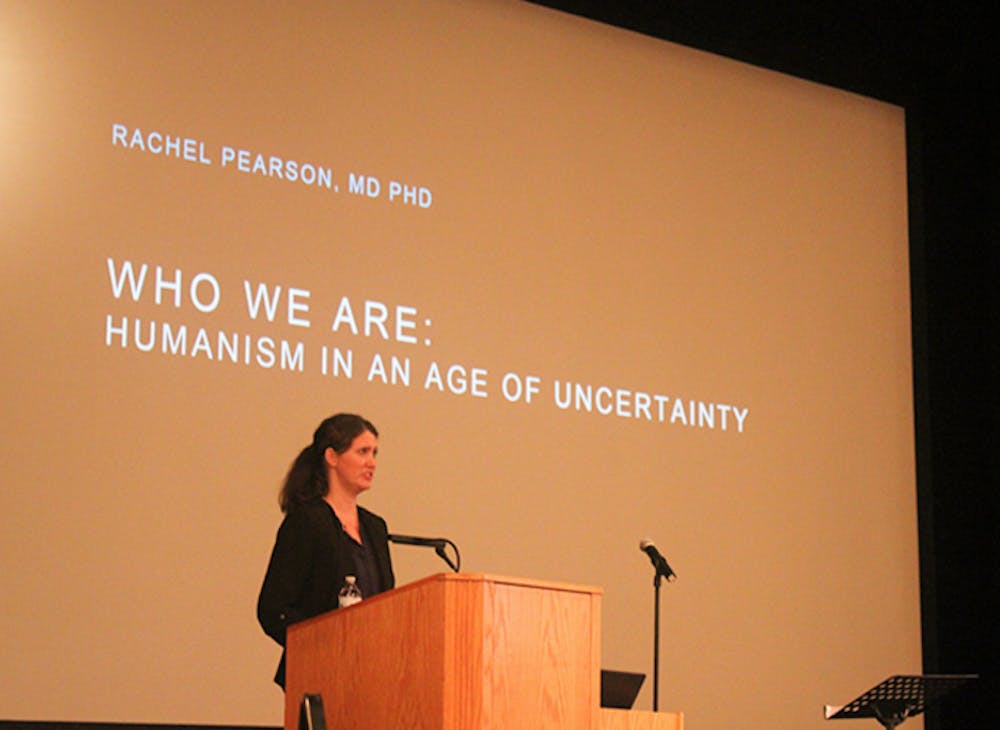By Emmy Liederman
Staff Writer
A patient with a mouth full of rotting teeth walked through the doors of St. Vincent’s Hospital, a student-run, free clinic in Galveston, Texas. The patient needed her teeth pulled, but dentures cost thousands of dollars, which she could not afford. The patient was at a standstill.
In a seminar entitled “Who We Are: Humanism in an Age of Uncertainty,” Dr. Rachel Pearson, the author of the College’s freshman summer reading book “No Apparent Distress,” shared personal experiences in the medical field, as well as poetry and historical references, as part of the College’s Community Learning Day on Sept. 27.
Pearson shared the story of the dental patient to encourage her audience to make a change in their generation.
“Looking into her mouth, I could see a lifetime of poverty, of neglect and of injustice,” Pearson said. “She asked how she would eat without dentures and I did not have an answer. There were times when my work made me feel helpless.”
Pearson used an excerpt from renaissance poet John Donne to frame her speech — “Any man’s death diminishes me, because I am involved in mankind.”

Pearson spoke of the need to ease the suffering of disenfranchised groups, even when it seems as if one is an outsider.
“We suffer too much under the notion that identity is everything,” she said. “Who we are at the most fundamental level is simply human.”
This mindset fueled Pearson’s work in the medical field. She realized that mankind needed to become a more supportive, cohesive unit when patients walked through the doors of St. Vincent’s after being deprived of care for far too long.
“I would see patients die of diseases that I knew were treatable,” she said. “That is the pain that I have not gotten over.”
According to Pearson, an examination of history suggests that through unimaginable tragedy almost always comes further meaning. When the bubonic plague rapidly spread across Europe, people had less faith in the power of the gods and began to rely on themselves for answers, bringing forth centuries of progress. Today, Pearson cites Hurricane Harvey, a natural disaster that has destroyed order in a place she calls home, as one opportunity to find meaning in heartbreak.
“You are inheriting a world that is a little less orderly than what your parents imagined for you when you were born,” she said. “A world fractured by hatred and war, a world that is flooded, a world that is quaking and burning, and getting ever so slightly warmer every day. I don’t know what the future holds. But I know, no matter what, I am involved. I know meaning will rise from the chaos and disruption.”
Pearson’s philosophy was demonstrated at the second component of Community Learning Day: a discussion panel entitled “Moving Towards Quality and Equitable Healthcare in New Jersey,” where a diverse group of panelists discussed the strengths and weaknesses of healthcare in New Jersey.
Each panelist had a different perspective and point of interest but a common goal: taking the bureaucracy out of medicine.
An idea that was brought up by multiple panelists was the need to speed up the medical process by allowing clinicians to work without heavy regulations.
“As a nurse practitioner, I can’t prescribe anything without a physician’s signature,” said Connie Kartoz, an assistant professor of nursing. “Clinicians need to be able to work to the maximum ability that their education provides.”
This is especially problematic for individuals whose problems have escalated due to the lack of ample care, and are in need of immediate relief. According to Health Education and Outreach Coordinator Bonniwell Graham III, there is a common theme among those who are frequently seen by medical professionals and those who are not.
“We need a better focus on the issue of health inequality for low income New Jersey residents and people of color,” Graham said.
Karotz reminded audience members that inequities exist in their own backyard.
“Between Princeton and Trenton, we have some of the greatest economic disparity not only in the state, but in the country,” she said.
Many of the panelists agreed that proper care for those with mental illnesses is lacking in New Jersey.
“Mentally ill patients are showing up in health clinics that are medically oriented,” said Rachel Adler, an associate professor of sociology and anthropology and a registered nurse. “They are not getting what they need and practitioners aren’t able to help them.”
Social sciences professor Phillip Prassa mentioned New Jersey’s opioid abuse epidemic and the timeliness of the topic of addiction, as September is national recovery month.
“Addiction is a disease, and not a disgrace,” he said. “It’s out there. It’s in our neighborhoods. It’s probably right down the road.”
Dr. Melanie Kaufer (‘07), an alumna and Hackensack Medical Center obstetrician-gynecologist, mimicked Pearson’s sentiment about the need to see patients before their problems escalate and it is too late to save them.
“It’s not uncommon that I’ll get a call about bleeding and the woman ends up having cervical cancer, which is so preventable,” she said. “These women just don’t have access to care.”
The central message of both Community Learning Day discussions was that the country needs to do everything in its power to prioritize equal access.
“We need to see healthcare as a right, rather than a privilege,” said senior public health major Tristan Gibson.







